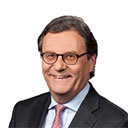
Hans-Joachim Otto
Hans-Joachim Otto (FDP) was a member of the Bundestag from 1990 to 1994 and again from 1998 to 2013. At the time of the debate, he was the spokesman for the FDP Bundestag’s cultural and media conference.
Hans-Joachim Otto (FDP):
Madam President. Ladies and Gentlemen. To come straight to the point, I do not find Hans Haacke’s project at all compelling in either its aesthetics or its political symbolism, and therefore I do not want it in our building.
In his explanatory notes to the project, Hans Haacke describes the inscription on the pediment, “To the German People,” as a nationalistic, exclusionary slogan. That is nothing less than a distortion of history. In fact, the dedication came as an act of republican emancipation in 1915 against the wishes of the Kaiser and therefore has its origins in loyalty to constitutional, even participatory, government.
(Applause from the FDP and CDU/CSU)
Ladies and gentlemen, if Hans Haacke believes that the term German people will always be tainted by the propaganda not only of the National Socialists but also of the East German SED, then he is forgetting that at a minimum the courageous citizens of the former GDR rehabilitated it with their shouts for freedom, “we are one people” – a German people – and won back its democratic tone.
(Applause from the FDP and CDU/CSU)
My most serious objection: Haacke’s project suffers from a most repugnant symbolism. If he considers the term people eternally defiled, then the same would at least be equally true for the ritual of earth gathering he provides for.
(Applause from portions of the FDP)
We don’t have to compare it to the Olympic Games of 1936 nor to the Nazi memorial site at the Quedlinburg collegiate church, where urns containing earth from all the German Gauen were deposited and where they still are today. The “blood and soil” mythology of the Nazis burdens the symbolism Haacke chooses for the collection of earth from the home district. A further contradiction I see in Haacke’s project is that the provocation he expressly aims for will hinder the participation he, at the same time, says he wants from as many Representatives as possible. How many of us, I ask you, will bring in our pail of dirt from the home district if in doing so we’re supposed to be rededicating the Parliament to fit the wishes of the artist but not our Constitution? Here is the key difference with Christo’s project of wrapping the Reichstag, to which I gave my enthusiastic support at the time: Christo had developed a convincing, viable, aesthetic concept.
(Applause from the FDP and portions of the CDU/CSU and Alliance 90/Greens)
He did not need to make the members of the Bundestag the instruments of his political convictions. He lobbied with aesthetics and not with political subtexts.
It is true: art does have the right, and sometimes the duty, to intervene in politics. But we politicians do not have the duty to jump through every hoop that artists place before us.
(Applause from the FDP, CDU/CSU, and portions of Alliance 90/Greens)
This vote – and here our colleague Dr. Lammert is entirely correct – is about self-respect on the part of this Parliament concerning its own history.
(Applause from Norbert Lammert)
My dear colleagues, we all recognize the freedom of art; however, we do not recognize a monopoly of art experts and the Arts Committee.
(Applause from portions of the FDP and the CDU/CSU)
Have the courage to make your own, individual, independent decision! Vote for the group’s motion! Thank you.
(Applause from the FDP, CDU/CSU, and portions of Alliance 90/Greens)
